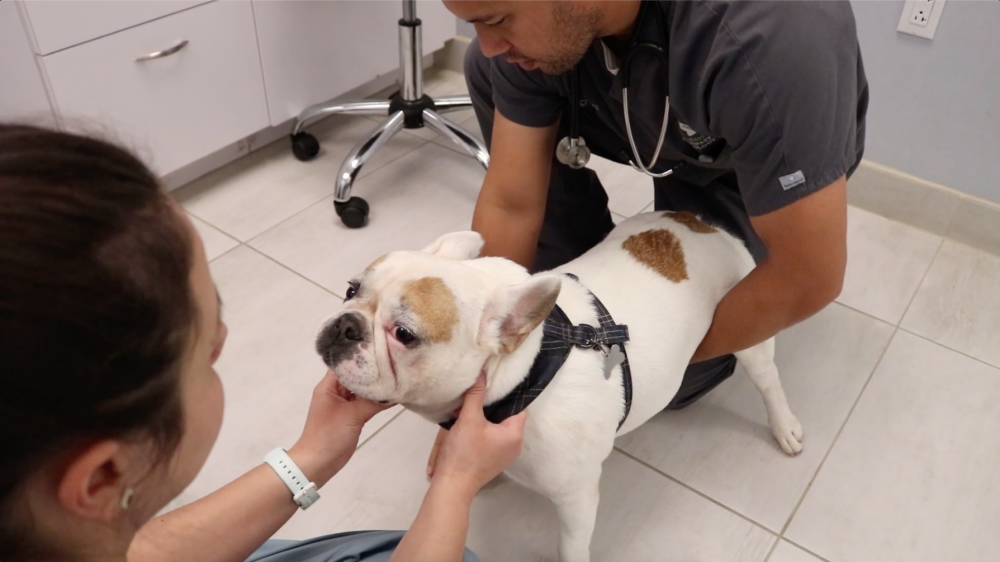

Frenchies: What the Internet Doesn’t Want You to Know
What to look out for in your Frenchie friend
Ahhh French Bulldogs… Adorable, bright, playful, affectionate, charming, and downright irresistible little dogs that get along well with other animals and don’t require too much exercise. What’s not to love? It’s no wonder their popularity has skyrocketed in recent years. But what are all the super cute Instagram posts not telling you?
One in five French Bulldogs has a neurologic issue. Unfortunately, some of our favorite Frenchie features are also what make the loveable litters prone to health problems. Due to selective inbreeding of a brachycephalic (short skull) and chondrodystrophic (short legs) body conformation, a high incidence of various diseases has been noted in the breed, including several neurologic disorders.
4 Most Common Neurologic Conditions in French Bulldogs
Neurologic conditions are disorders of the nervous system. Just like people, dogs have a nervous system consisting of a brain, spinal cord, nerves, and muscles. The nervous system helps the body interact with its surroundings through vision, touch, smell, hearing, and balance. It also tells the rest of the body what to do by initiating and controlling movements.
The most common neurologic issues associated with French Bulldogs occur in the spinal cord or the brain, with the spine being affected most often.
1. Intervertebral Disc Disease (IVDD)
The number one neurological disorder affecting French Bulldogs is IVDD. Also known as bulging, slipped, herniated, or ruptured disc, IVDD occurs when the shock-absorbing discs between spinal vertebrae deteriorate.
2. Autoimmune Inflammation
In French Bulldogs, inflammation is usually autoimmune and can occur in the spinal cord (myelitis), the membranes surrounding the brain and spine (meningitis), the brain itself (encephalitis), or a combination of the membranes and the brain (meningoencephalitis).
3. Brain Tumors
Gliomas are the most common tumor found in French Bulldogs. Canine gliomas are malignant brain tumors that can be either slow-growing or aggressive and difficult to treat.
4. Congenital Malformation
In French Bulldogs, malformations of the spine are quite common. Basically this means that the vertebrae have formed differently than they were anatomically meant to.
What to look out for in your Frenchie Friend
Symptoms of spinal cord problems are rated on a scale of 1-5, with 5 being a dire emergency.
Symptoms of Spinal Cord Problems
- Back or neck pain
- Able to walk, but weak or wobbly gait
- Too weak to walk, but motor function is preserved
- Paralyzed, but can feel legs
- Completely paralyzed with no feeling in legs
Symptoms of brain problems manifest quite differently, many times with a change in behavior being the presenting clinical sign.
Symptoms of Brain Problems
- Seizures or head tremors
- Head pressing (pressing head against wall)
- Abnormal eye movement
- Circling or wandering aimlessly
- High stepping, balance issues, or swaying
- Behavior changes (staring, lost, not excited, or just not him or herself)
What to do if you suspect your French Bulldog has a neurologic problem
A veterinary neurologist should evaluate your Frenchie to confirm the symptoms are indeed neurologic, determine whether the problem is in the spine or the brain, understand the exact location of the issue, and judge its severity.
Magnetic Resonance Imaging (MRI) is typically recommended for the most accurate diagnosis. Not only will MRI rule out other less common possibilities, but it will also help identify the best medical or surgical treatment option for your dog, which can vary greatly from case to case.
In most cases, the earlier a condition is discovered, the better the outcome for the patient. So, if your favorite Frenchie is experiencing any symptoms, please don’t wait to seek expert medical advice.
Southeast Veterinary Neurology has teams of compassionate experts across South Florida standing by 24 hours a day, seven days a week to assist your furry family. For anyone looking for more information on neurologic conditions in dogs, Southeast Veterinary Neurology’s Website, Facebook, Instagram, and YouTube channels are full of free content, while live Q&A sessions and intensive webinars are ongoing.
Join the newsletter and never miss out on dog content again!
"*" indicates required fields
By clicking the arrow, you agree to our web Terms of Use and Privacy & Cookie Policy. Easy unsubscribe links are provided in every email.

